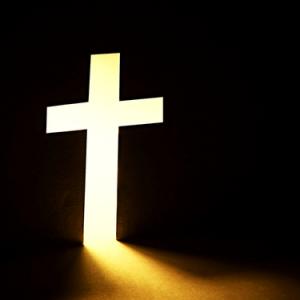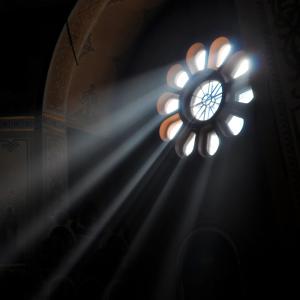Posts By This Author
Dynasties and Birthrights
Reflections from the Common Lectionary, Cycle A
THE CHILDHOOD UNDERSTANDING of the familiar tune about climbing Jacob’s ladder needs a reset. The Genesis narratives aren’t just about heaven—they yield epiphanies into the ordinary life of faith. The household of Abraham and Sarah, even in its ancient context, is atypical. In family dynamics, without the miraculous moments, epiphanies subvert our expectations of whom and what God can utilize to reveal the faithfulness of divine promises. Sometimes the testimony is evident in ordinary lives—even ours. You’ve heard it said, “Our greatest weakness is our strength.” The episodes in Jacob’s life provide sufficient demonstrations of how passions both energize and blind us: Passion or anger; leadership or arrogance; emotion or intuition; determination or stubbornness.
Despite Jacob’s inconsistencies, the second half of Genesis encompasses his story, as the son of Isaac, grandson of Abraham. Here we find an unfolding drama. Characters display human nature at its extremes: conniving relatives, loving couples; creative entrepreneurs, dishonest contractors. All, somehow, used by God to form a people with whom the Spirit so evidently abides.
Even when we go our own way, God’s purposes are not thwarted. The challenge for the church in this Pentecost season is to trust that God is planting seeds in good soil—and the seeds that won’t sprout also have a purpose in this garden. Remember that the actions of justice, grace, and faithfulness we practice at home are as much a witness to God as our public proclamations and protests.
God Sets the World Right
Reflections on the Revised Common Lectionary, Cycle A
EVER SINCE ADAM AND EVE ate themselves out of house and home, we’ve experienced a brokenness in our lives. Rather than offer praise for God’s wondrous acts, we attempt to build God’s kingdom ourselves. Rather than tell of God’s greatness, we whine that religious obligation demands too much. Rather than involve ourselves in the community, we divide into factions over whether we should work or pray, wait or proceed. Still trying to be more god-like than accepting the assignment to bear God’s image in the world, we attempt to make a name for ourselves. The result? Human-initiated plans cast in language that parodies God’s own plan, pitting human counsel against divine. Setting nation against nation.
Pentecost marks a special occasion in the life of the Christian community. This extraordinary record of what we call the “birthday of the church” is less often noted as the 50th day after Passover—a day to pause, gather, and remember the great acts of God. Passover marks the liberation of the enslaved children of Israel from Egyptian oppression, and Pentecost is the moment “the Holy Spirit is poured out by God ... to empower the church to advance Christ’s mission to the very ends of the earth,” as David P. Gushee puts it.
The Pentecost mission involves patience with God’s timing, which is submission to God’s will. Meanwhile, rather than looking up for Christ’s return, we look for opportunities to be evidence that the kingdom has come.
Telling a Resurrection Story
Reflections on the Revised Common Lectionary, Cycle A
THERE IS NO controlling a story once it’s out. Even in the times before cell phones, the internet, and Twitter, news traveled a similar route through participants, eyewitnesses, and those with the privilege to eavesdrop upon rumors and reports. Details get scattered, but the facts stand out. Many stories can be told about who, when, and how the story leaked. But all those specifics remain secondary to the spectacular announcement. For example, in 1903, how did The Virginian-Pilotscoop other newspapers to be the first to cover the beginning of the aviation age? No one really knows. Orville and Wilbur Wright believed their hometown Dayton newspapers should make the announcement. Indeed, on Dec. 18, the day after the first flight, the Dayton Evening Heraldreported the news—directly based on a telegraph sent by Orville Wright. But three other papers had already reported this world-changing occasion based on TheVirginian-Pilot’s story. Though filled with inaccuracies, the original accounts correctly announced the single important fact: There had been a flight!
Two thousand years earlier, the witness of a few women called forth centuries of testimonies that describe a progression from lack of recognition to full recognition of Jesus the person, as well as the significance of his death and resurrection. The cross and the empty tomb are not self-explanatory; they require interpretation. On the other side of the Lenten journey, Easter provides opportunities for the church to reflect on the biblical witness concerning the rumors of the resurrection. These texts highlight not only the necessity of interpretation, but also the sources and shape of valid interpretation.
Why is the Cross Necessary?
Reflections on the Revised Common Lectionary, Cycle A
THIS GENERATION IS wired a bit differently than previous generations. I don’t only mean the vitality of portable multitasking devices that provide continuous streams of global news, entertainment, gaming, and random opinions from 2,157 of their closest friends. In all fairness, it’s not their fault. They are who we taught them to be. Often they seek the good, but not God.
Notwithstanding a persistent rejection of organized religion, many in this generation continue to seek power, transcendence, and mystery. Though church membership is down, a steady number continue to express a profound interest in spirituality. In a post-theistic context, says Diana Butler Bass, “many Americans are articulating their discontent with organized religion and their hope that somehow ‘religion’ might regain its true bearings in the spirit.” It’s worth noting that many remain attracted to the idea of Jesus.
These last weeks of Lent invite a rehearsal of faith journeys that lead to rumors of resurrection. Glittering gadgets and tantalizing trinkets will not rid us of an awareness of the futility of our efforts to bring about change. Gossip and trends will not provide Christians with the vitality that facilitates a genuine hope for good. By submitting our ideas of justice to the witness of the reign of God, we pass on the confidence that the faith of the past can sustain us to live into the future. Not only as if there is a God, but as if our God has the power to rebuild and revitalize all that injustice has shattered.
God's Dangerous Promises
Reflections on the Revised Common Lectionary, Cycle A
INVITATIONS COME. Yet an expressed desire for your presence does not guarantee your willingness to show up. Invitations require a response. Some responses indicate significant commitment beyond “just showing up.” A summons may first entail an RSVP indicating a commitment to actually take an active part in the opportunity.
Such is the case for the people of God. Invitations arrived inviting God’s people to be witnesses to the power and presence of a particular God and to become a people who practice justice and favor kindness—peculiar expectations for an ancient culture, for any culture. A requirement of this sort unsettles the status quo of cultural mores where religion represents polytheistic attributions to a type of celestial Santa Claus or divine ATM, or where religion has been privatized—set aside from public prophetic witness to meditative reflection in the privacy of our own homes with occasional festive gatherings. Such genie-worship and privatization results in a deafening silence among the people of God. As Pope Francis put it recently, “a privatized lifestyle can lead Christians to take refuge in some false forms of spirituality.”
The promises that God calls us to are promises that Michael Frost, in Exiles, calls dangerous. They accompany dangerous memories that make a dangerous critique of society.
Over the next five weeks, the invitations extended in these texts indicate more than increasing the head count of seekers of spirituality. They require a response that signifies a commitment to participating in a community whose primary purpose is to expose the dangerous promise of God.
What Is the Lord's Justice?
Reflections on the Revised Common Lectionary, Cycle A
EXECUTE: TO ENACT OR DO. Having grown up in inner-city Chicago, I have fond memories of red fire hydrants, swinging jump ropes, and church robes. During summer, the fire department would open the hydrants. Parents granted the petitions of children to run through the streams of water, soaking our clothes and cooling our backs. And while I never achieved the rhythmic agility to jump Double Dutch, I loved to recite the rhymes, which eventually helped me gain a verbal dexterity like that of my pastor. I wanted one day to have a robe like hers—one that signaled that the words I spoke revealed the reign of God.
Turn the clock back. Some children would hold very different memories of fire hydrants, ropes, and robes. In Birmingham, Ala., in1963, the force of the water injured petitioners for freedom. During the American Revolution, a Virginia justice of the peace named Charles Lynch ordered extralegal punishment for Loyalists to the Crown. The swinging rope became the tool of mob violence. And the “hooded ones” continue to use the label of “Christian” to make a mockery of the vestments of clergy.
Fire hydrants. Ropes. Robes. Execute: to eliminate or kill. Meaning conveyed to the hearer may not at all resemble the intention of the speaker. Often communication requires suspension of what we think in order to listen to the context from which the speaker shares. Reading is no easier a task. Sometimes the same letters forming the same word present entirely different meanings. Justice executed. What does it mean?
The context for the next four weeks exposes what the Lord’s justice requires.
Moving into Epiphany's Light
Reflections on the Revised Common Lectionary, Cycle A
A NEW CALENDAR YEAR marks the end of the Christmas season and a shift to the season of Epiphany that spotlights the reality of the Incarnation. In sync with our personal promises to discontinue bad habits in favor of better practices, the lectionary readings capture familiar expressions of vocational clarity and ministerial frustration. The season is a mosaic of self-examination peppered with moments of great light penetrating the darkest despair. Whether ancient Israel (living in exile in the sixth century B.C.E.), the followers of Jesus (in the first century C.E.), or 21st century seekers of spirituality without religion, the description is the same: The disenfranchised, disappointed, and divided discover a glimpse of the reign of God.
Read these texts as snippets of ancient social media: status updates of a prophet, blogs about the ministry of Jesus, and PDF files about early church practices. Each exposes the light of God pushing into the darkness of human existence: frustrated ministers, radical promises of forgiveness, reports of flourishing charismatic leaders, stalemated efforts due to divided affiliations, petitions for lawmakers to practice impartiality, and the death of one imprisoned on suspicious testimony. Familiar, jarring, and too often tamed, these texts deserve at least the attention afforded public policy debates and celebrity rumors.
A close reading of the text does not lend safety by avoiding the prophet, ignoring John’s message, or disputing baptism rituals. Every baptized believer is called to arise and live as if the kingdom of God has come.
The New Commonwealth of God
Reflections on the Revised Common Lectionary, Cycle A
A PROFOUND SENSE of expectation launches a new year. As the season of Advent commences the Christian year, just weeks before the turn of the calendar year, familiar biblical stories invite us to begin again by glimpsing the coming reign of God. Weekly worshippers and annual attendees gather for the season premiere of the greatest story ever told. A promise. A vision. A hope. Great expectation.
The ancient prophet, psalm, gospel, and epistle together extend to the contemporary preacher words of unflinching hope that emerge fresh from the rubble of turmoil, trial, and tribulation of every God-seeking generation. Today’s words of hope must also descend like the savory aroma of a holiday meal, promising solace to the harmed, heartbroken, and hindered.
Familiarity with the Advent and Christmas narratives may leave us unaware of the radical expectation and potential impact that reciting these events can bring. These readings offer an arresting narrative of divine presence inaugurating an unprecedented commonwealth from among the divided nation. The vision makes no sense if it does not offer an alternative to the existing promises of “life, liberty, and the pursuit of happiness.” The narrative challenges us to understand that our celebration of the birth of Jesus is not shiny lights or a musical presentation. It anticipates the arrival of goodness signaling an end to corruption and gloom. This global holiday extends the drama narrated in Christian scripture as each generation must wrestle again with the contemporary relevance of the birth of Jesus.







